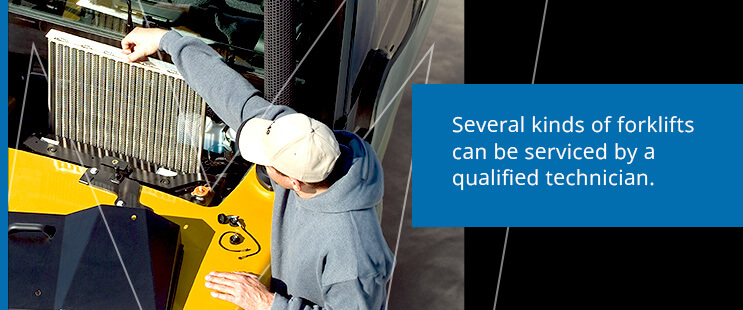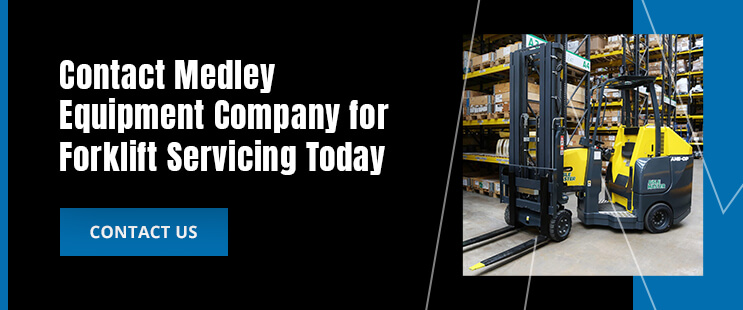
Forklift Maintenance Guide: Forklifts are integral material-handling units in warehousing operations and other industries. However, they aren’t immune to the wear and tear that accompanies heavy equipment, making proactive maintenance a must. The more you use your forklifts, the more maintenance they require.
Planned maintenance helps prolong the life span of your forklift, save money and enhance productivity. We created this handy guide to forklift maintenance, including signs to service your forklift, fundamental components to inspect and the benefits of consistent maintenance.
When Should You Service a Forklift?
Most forklift servicing companies recommend planned maintenance every 250 to 300 hours, but always check the manufacturer’s recommendations. You will need to perform different maintenance tasks at different intervals. For instance, you may need to change engine fluids more often than hydraulic fluids.
Several variables can also impact forklift maintenance frequency, such as:
- Age: Older equipment typically requires more maintenance than newer models, and forklifts are no exception.
- Type of forklift: Internal combustion forklifts have more moving parts than their electric counterparts, so they usually warrant more frequent maintenance. Electric forklifts don’t have engines, transmissions and radiators, which reduces maintenance demands.
- Frequency: Naturally, forklifts that see everyday use will require more frequent servicing than occasionally used forklifts.
- Environment: Forklifts that operate in harsh environments and extreme temperatures often require more frequent servicing beyond the recommended standard.
Prepping for Spring and Summer Seasons
As we roll into spring and temperatures start to climb, forklift owners and operators must prioritize a regular maintenance schedule to prevent weather-related damage. Here are some vital components to include in your spring forklift maintenance plan:
- Coolant: Using forklifts outdoors during warmer seasons exposes the units to high temperatures. This increases the risk of overheating, which can damage the engine and other critical elements. That’s why monitoring and replenishing coolant levels is essential.
- Battery fluids: Extreme temperatures can cause electric forklift battery fluids to evaporate, potentially shortening the forklift’s service life. Perform comprehensive forklift battery maintenance, including checking water levels in the battery cells and ensuring proper pH levels.
- Tires: Excess heat can cause rubber tires to deteriorate and crack. Examine forklift tires carefully for wear and tear.
Signs to Service Your Forklift
Below are some general indicators that your forklift needs maintenance. Call an experienced technician if you notice any of the following issues:
1. Leaks
If you spot a puddle on the ground after removing the forklift from its parking space, the unit may be leaking hydraulic fluid, brake fluid, coolant or transmission fluid.
2. Warning Lights
Similar to a car, your forklift has a dashboard that displays a warning light when it detects an issue. This light can mean anything from low brake fluid to a potentially serious engine problem that requires prompt forklift service.
3. Excessive Emissions
While it’s normal for internal combustion forklifts to produce some exhaust, abnormal fumes or clouds of smoke can signal an issue with the engine or exhaust system.
4. Faulty Brakes
Squeaky brakes can suggest worn-out brake pads or shoes. Excess grinding could mean these parts have completely worn down, causing metal-on-metal contact. Regularly inspect brake pads and shoes as part of routine maintenance. If they have significantly thinned out, have a technician replace them as soon as possible.
What Does Forklift Maintenance Include?
While internal combustion and electric forklifts share a few of the same components, planned maintenance can vary depending on the type of forklift. A skilled technician can service different types of forklifts. They can locate the source of the issue and perform the necessary repairs to get your forklift back on track.

Here are the different forklift components to inspect — and schedule repairs for when necessary.
Internal Combustion Forklifts
Be sure to account for these components during inspection and planned maintenance:
- Engine oil: Engine oil shouldn’t drop below the acceptable level. Low oil can lead to premature wear and damage, possibly causing a total engine failure. The color of the oil can also indicate its condition. Brown usually signifies fresh, healthy oil. A milky white color can indicate the presence of water in the forklift’s sump. Thick, black oil means the engine has been heavily used and exposed to dirt and dust. An experienced technician can help ensure the proper engine oil levels in your forklift and investigate problems.
- Coolant and hydraulic fluids: Coolant helps keep the engine from overheating and prevents corrosion. It’s important to inspect the radiator and reservoir for any leaks that could reduce coolant levels. Additionally, check the forklift’s brake, power steering and hydraulic fluids. These fluids play a vital role in heat transfer, energy transmission, lubrication and contamination prevention.
- Belts and hoses: Scrutinize these components for wear and cracks. A qualified technician can replace damaged belts and hoses when necessary.
- Radiator and air filter: Check your forklift’s radiator and air filter to ensure they’re clean. How often you change a forklift’s air filter can vary widely depending on usage and operating environment, so check your manufacturer’s recommendations and perform regular inspections to promptly identify dirty filters.
- Tires: Inspect tires for signs of wear, including cracks, tears, chunking, flat spots and low tire pressure. These signs usually signal the need for replacement. Contact us to replace your forklift tires.
Electric Forklifts
Periodically examine these electric forklift components and schedule servicing when necessary:
- Battery: If your forklift runs on a lead-acid battery, check the water level regularly to ensure it’s sufficient. Lead-acid batteries are also prone to sulfur deposits. As these deposits accumulate and expand on the lead plates, they can crack the plates and cause the battery to short-circuit. Lithium-ion batteries tend to require less maintenance than lead-acid batteries, but ongoing inspection is still a must. Regardless of your electric forklift’s battery type, call a professional technician to replace this component when needed.
- Wiring: Loose internal cables can disrupt forklift operation. They can become tangled with other moving parts, block ventilation pathways and interrupt signal transmission, causing forklift inefficiencies and breakdowns. Check cables to ensure they aren’t loose or frayed.
- Tires: Like the tires on internal combustion forklifts, electric forklift tires should be regularly inspected for wear. Again, a professional should always perform forklift service for tires.
The Benefits of Regular Forklift Maintenance
Consistent forklift maintenance can benefit your operations in numerous ways:
- Cost savings: Planned maintenance helps you catch minor flaws before they spiral into significant problems. It prevents expensive repairs and replacements down the line, providing substantial cost savings.
- Extended life span: Ongoing planned maintenance helps you reap maximum performance from your forklift throughout its operational life. The more vigilant you are about maintenance, the longer your forklift will likely last.
- Improved productivity: Forklifts are indispensable tools for material handling operations, so a breakdown can cost valuable time and efficiency. Routine maintenance helps keep forklifts in top-notch shape so they can provide the performance your workload requires. You can avoid unnecessary downtime and productivity loss by sticking to a regular planned maintenance schedule.
- Greater fuel efficiency: An optimized forklift runs more efficiently, which can help you reduce operating costs and your carbon footprint.
- Safer workplaces: Forklift malfunctions can create significant hazards, such as collisions or exposure to battery chemicals. Regular maintenance is essential for creating a safe work environment.
Schedule a Forklift Service With Medley Equipment Company Today
Routine maintenance is essential to ensure reliable, long-lasting forklift performance. If you’re seeking a service provider you can trust, Medley Equipment Company provides comprehensive forklift maintenance services. We serve a variety of locations throughout Arkansas, Missouri, New Mexico, Oklahoma and Texas, making it easy to find our expert technicians near you.
Whether fluid replenishments, air filter changes or tire and battery replacements, we handle it all. Contact our team to schedule forklift planned maintenance today!

